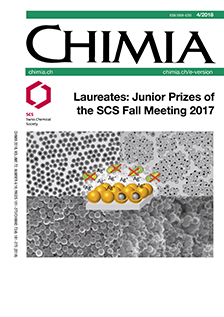Understanding Non-Covalent Interactions: Correlated Energy Decomposition Analysis and Applications to Halogen Bonding
DOI:
https://doi.org/10.2533/chimia.2018.193Keywords:
Dispersion interactions, Electron correlation, Energy decomposition analysis, Halogen bonding, Non-covalent interactionsAbstract
Non-covalent interactions play a primordial role in chemistry. Beyond their quantification, the detailed understanding of their physical processes is necessary to rationalize chemical trends and improve designs of chemical systems. Energy decomposition analyses allow detailed insight into non-covalent interactions by extracting electrostatics, Pauli repulsion, polarization, dispersion and charge transfer components from interaction energies. Recent work has demonstrated that electronic correlation influenced significantly all of these energy components, whereas previous decompositions only partitioned correlation between dispersion and charge transfer. The MP2 energy decomposition analysis with Absolutely Localized Molecular Orbitals (MP2 ALMO-EDA) takes these results fully into account and offers a correlation correction for each extracted component. A recent detailed investigation of the CCSD dispersion energy showed that a small number of virtual orbitals is sufficient to describe dispersion interactions accurately in the long-range, which potentially offers a basis-set independent definition of dispersion. Finally, we present an application of MP2 ALMO-EDA to a series of unusual halogen bonding complexes where charge transfer dominates over the electrostatic ?-hole interaction.Downloads
Published
2018-04-25
Issue
Section
Scientific Articles
License
Copyright (c) 2018 Swiss Chemical Society

This work is licensed under a Creative Commons Attribution-NonCommercial 4.0 International License.
How to Cite
[1]
Chimia 2018, 72, 193, DOI: 10.2533/chimia.2018.193.







